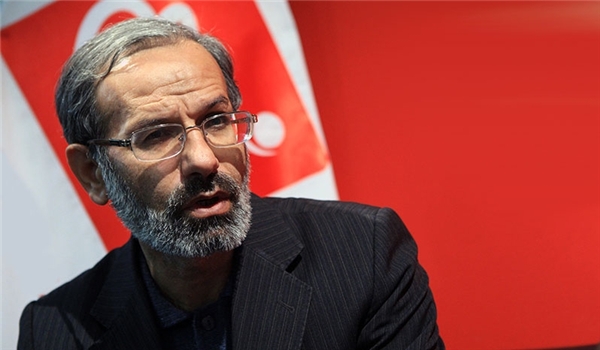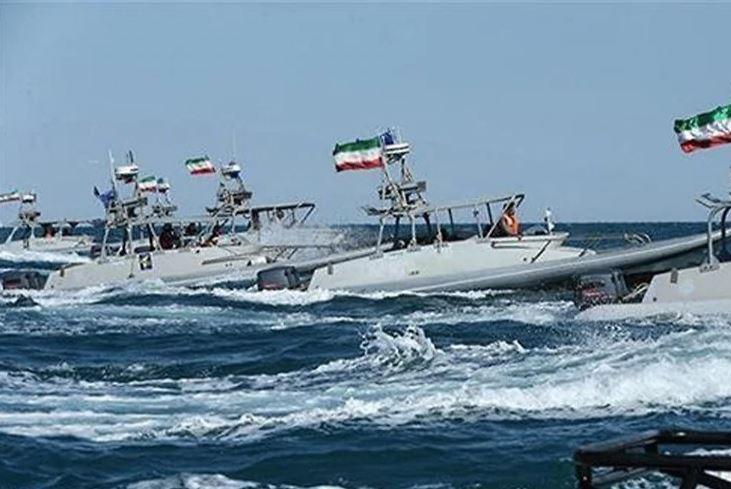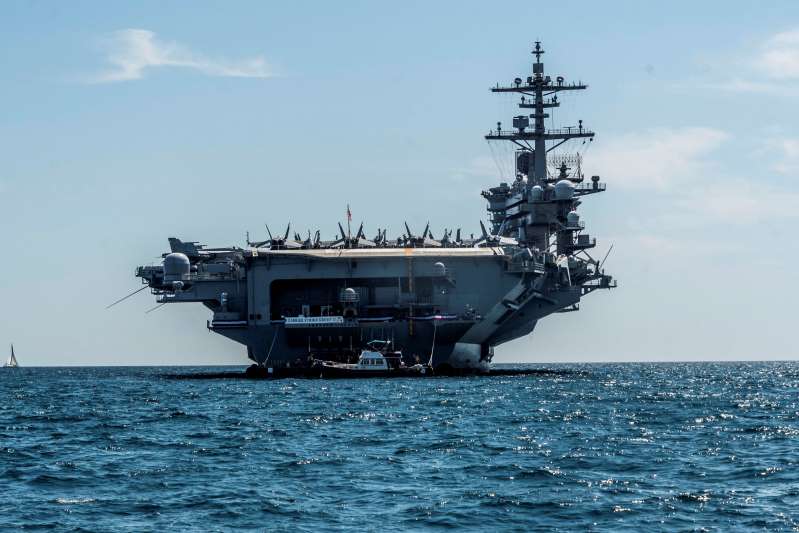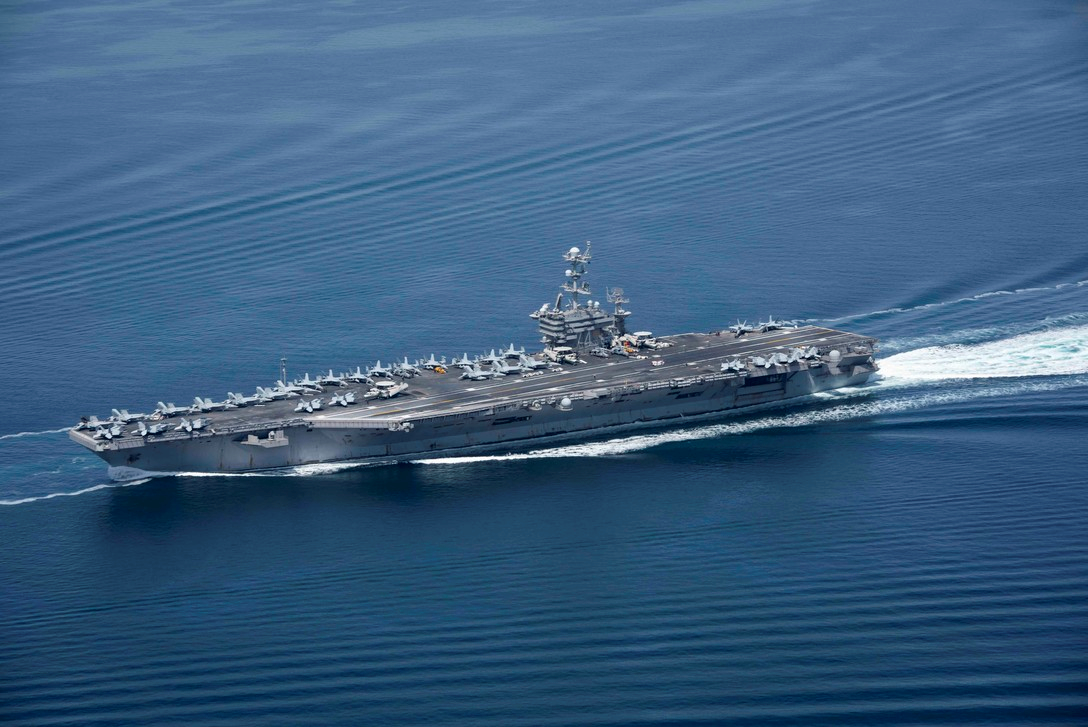www.aljazeerah.info
News, May 2019
Archives
Mission & Name
Conflict Terminology
Editorials
Gaza Holocaust
Gulf War
Isdood
Islam
News
News Photos
Opinion Editorials
US Foreign Policy (Dr. El-Najjar's Articles)
www.aljazeerah.info
|
Editorial Note: The following news reports are summaries from original sources. They may also include corrections of Arabic names and political terminology. Comments are in parentheses. |
Despite Deployment of USS Abraham Lincoln Carrier, Americans Assured Iranians it's Just Economic, Political, and Media Warfare
May 6, 2019
 |
 |
| Senior
Iranian political analyst, Sa'dollah Zareyee, who revealed the
US message of "No Military Action" to Iran, file, May 4, 2019 |
Iranian navy boats at the Strait of Hurmuz, file, 2019 |
 |
 |
| The USS Abraham Lincoln aircraft carrier is pictured off the Balearic Islands of Spain on April 16, 2019 | The aircraft carrier USS John C Stennis steams in the Strait of Hormuz, April 7, 2019 |
Iran to Declare Reciprocal Moves against US Sanctions Soon
May 6, 2019, TEHRAN (FNA)-
Iran is to declare a set of decisions that would come in reaction to the US withdrawal from the 2015 nuclear deal and re-imposition of sanctions against Tehran, including a number of moves dealing with the Joint Comprehensive Plan of Action (JCPOA).
The Islamic Republic of Iran's government has decided to enforce specific decisions to reciprocate the US unilateral sanctions.
The decisions will include specific measures under the contents of the nuclear deal in return for oil and banking sanctions against Iran.
Washington withdrew from the internationally-endorsed 2015 nuclear deal with Iran, reimposed the toughest-ever sanctions against the country and started a plan to zero down Tehran's oil sales.
Under the nuclear agreement reached between Iran and six world powers in July 2015, Tehran undertook to put limits on its nuclear program in exchange for the removal of nuclear-related sanctions.
Yet, Iran continued compliance with deal, stressing that the remaining signatories to the agreement had to work to offset the negative impacts of the US pullout for Iran if they want Tehran to remain in compliance. The Iranian officials had earlier warned that the European Union’s failure in providing the needed ground for Tehran to enjoy the economic benefits of the nuclear deal would exhaust the country's patience.
Head of the Atomic Energy Organization of Iran (AEOI) Ali Akbar Salehi warned in December that his country enjoys the capability to restore 20-percent uranium enrichment if the parties still remaining under the 2015 nuclear deal could not remain committed to their undertakings.
Salehi said that under the 2015 nuclear deal, Iran accepted to put confidence-building curbs on its nuclear program, but they do not obstruct the “peaceful activities of Iran’s nuclear industry”.
“Enrichment is currently underway, but we would put aside the 300kg limit (set by the nuclear agreement) whenever we wish, and would do the enrichment at any volume and level,” he said in an interview with state TV on the sidelines of a visit to the Fordo nuclear facility.
“We currently have 1,044 centrifuges in Fordo, and if the establishment wants, we will restart 20-percent uranium enrichment in Fordo,” he noted.
He expressed hope that the remaining parties to the nuclear agreement would deliver on their promise and implement their obligations in order to fill the gap created by the US after its unilateral withdrawal from deal, officially known as the JCPOA.
Otherwise, he said, Iran would have to reduce its JCPOA commitments.
“I would like to warn that this is not a bluff; I have kept my word whenever I’ve said something. Now I’m emphasizing once again that if the establishment wants, we can easily return to the 20-percent enrichment, and meet the country’s needs at any level and volume,” he noted.
Europeans' honesty in dealing with the Iran nuclear deal has always been seriously doubted by Iranian masses that were discontent with talks with European counterparts.
In contrast with what European politicians and government are stating, many experts in Iran were suspicious of Europe's genuine commitment to the letters of the nuclear agreement of July 14, 2015, and were on different occasions voicing their discontent with what they describe as Europe's strategy of killing time.
Even some commentators like Seyed Mostafa Khoshchashm had called on the Iranian government to start meaningful modifications in JCPOA undertakings, and specially remove the cap on the country's enriched uranium stockpile after the US unilateral withdrawal from the agreement; a call which gained momentum among the Iranians.
The US state department announced on Friday that it had not extended two waivers, one that allowed Iran to store excess heavy water produced in the uranium enrichment process in Oman, and one that allowed Iran to swap enriched uranium for raw yellowcake with Russia.
Until now, Iran was allowed to ship low-enriched uranium produced at Natanz to Russia before it hit the 300-kg limit and the US measure leaves no way for Tehran other than exceeding the ceiling for storing the enriched uranium in violation of the 2015 nuclear deal.
Also, the United States would no longer waive sanctions that allowed Iran to ship heavy water produced at its Arak facility beyond a 300-ton limit set in the 2015 nuclear deal to Oman for storage which again forces Tehran to store it inside country in violation of the nuclear deal.
In return, Iranian Parliament Speaker Ali Larijani said on Saturday said that Iran would continue uranium enrichment after Washington defied to extend waivers on swapping enriched uranium for raw yellowcake with Russia, a mechanism stated in the nuclear deal to ensure a ceiling of a 300kg enriched uranium stockpile in Iran.
"The Americans have stated in the past few days that Iran is not entitled to produce heavy water, while we have not violated the (2015) nuclear deal and the laws and if you (the Americans) do not buy it, it is not important and we continue what we are doing," Larijani said in Tehran, addressing a group of Iranian school teachers on the occasion of Teachers Day in Iran.
Reminding that Iran had been importing yellowcake to process it into enriched uranium and sold the final product to Russia to keep its enriched uranium stockpile under 300kg, as enshrined in the Joint Comprehensive Plan of Action, he noted the US' recent decision to end waivers on this JCPOA undertaking, and said the Americans had also voiced opposition to Iran's enrichment of uranium.
Larijani addressed the US and other western states, saying that Iran did not care if its enriched uranium was purchased or not as "Iran will continue enrichment", implying that Tehran would be forced to go above the ceiling if the stated JCPOA-related mechanism fails.
Larijani's remarks meant that Iran would not go for the second option which entails stopping heavy water or uranium production to avoid exceeding the stated ceilings if Oman and Russia choose to comply with the US sanctions in violation of the JCPOA.
Iranian Deputy Foreign Minister for Political Affairs Seyed Abbas Araqchi said last Tuesday that the nuclear deal between Tehran and the world powers might die any moment now, warning that the US efforts to ruin an international treaty had damaged Tehran’s trust in any international agreement.
Speaking during a visit to Turkey for Iran-Turkey political consultations, Araqchi said that Tehran’s patience with the US was wearing thin.
"Iran has given enough chances to diplomacy, but enough is enough," Araqchi who was the second lead negotiator during the nuclear talks with the world powers said, and warned, "Unfortunately, the JCPOA has come very very close to its end."
He said his country would definitely take action against the US campaign of intensifying pressures on Iran that also included efforts to zero down the country's crude sales.
He said the nuclear deal of the 2015, also known as the Joint Comprehensive Plan of Action (JCPOA), was a security deal involving the entire world, and lamented that "the US financial system has cast a shadow on everyone".
The diplomat reiterated that the agreement was clinched between Iran and 5+1 Group of countries (Russia, China, France, the US, the UK, and Germany), but in principal it was an accord belonging to the global community.
Reiterating that the JCPOA was the sole diplomatic success of the region, Araqchi said that US exit from the deal reduced Iran’s trust in the international deals, as the US was seeking to destroy the only regional diplomatic achievement.
http://en.farsnews.com/newstext.aspx?nn=13980216000636
***
Senior Expert Reveals US Message of "No Military Action" to Iran
May 4, 2019, TEHRAN (FNA)-
A senior Iranian political analyst disclosed that high-ranking US administration officials have sent a message to Iran to stress their intention to remain in a no-war situation with the country.
"Recently, senior US government officials have sent an official message to the high-ranking Iranian officials stressing that they have no plan for military conflict with Iran under any circumstances," Sa'adollah Zareyee said in an interview with the Persian-language service of Tasnim news agency on Saturday.
He added that there is no sign of any US intention to launch war against Iran, saying that reasons are galore to show that Washington wants to avoid military conflict and has focused on economic, political, and media warfare.
In September 2018, Supreme Leader of the Islamic Revolution Ayatollah Seyed Ali Khamenei had reiterated that the chances of a war breaking out against Iran were zero, yet he urged the country's armed forces to enhance their deterrence power.
"Political calculations show that there is no chance for a military war, yet the armed forces are needed to boost their equipment and human capabilities vigilantly and through an efficient and agile management," Ayatollah Khamenei said at a meeting with senior commanders and officials of the Air Defense Base of the Islamic Republic of Iran's army here in Tehran.
In similar comments last August, Ayatollah Khamenei dismissed speculation about war with the US, reiterating that neither Iran was willing to initiate war against Washington nor did the US enjoy the self-confidence to open fire at Tehran.
"Recently, the US officials have been talking blatantly about us. Beside sanctions, they talk about war and negotiations. They talk about a spirit of war to frighten the cowards," Ayatollah Khamenei said, addressing a large number of Iranian people from all walks of life in Tehran.
"In the matter of negotiations, they play a poor game. One of them says, negotiations with preconditions, another one says, negotiations without preconditions. Let me address the people on the matter in a few words: There will be no war, nor will we negotiate with the US. This is the gist of the word that all the Iranian people should know. The US has now suggested negotiations; this is not new. This has existed since the beginning of the revolution," he underlined.
http://en.farsnews.com/newstext.aspx?nn=13980214000910
***
In message to Iran, White House announces new military assets in Middle East
By Karen DeYoung, Missy Ryan
Washingto Post, May 6, 2019
The Trump administration is sending an aircraft carrier and a bomber task force to the Middle East, the White House said Sunday, in a show of force aimed at Iran.
“In response to a number of troubling and escalatory indications and warnings, the United States is deploying the USS Abraham Lincoln Carrier Strike Group and a bomber task force to the U.S. Central Command region to send a clear and unmistakable message to the Iranian regime that any attack on United States interests or on those of our allies will be met with unrelenting force,” national security adviser John Bolton said in a statement.
“The United States is not seeking war with the Iranian regime, but we are fully prepared to respond to any attack, whether by proxy, the Islamic Revolutionary Guard Corps, or regular Iranian forces,” the statement said.
A defense official, speaking on the condition of anonymity because he was not authorized to discuss the matter, said there were indications “that Iranian forces and proxies were making preparations to possibly attack U.S. forces in the region.”
But neither Bolton nor the Defense Department identified what actions Iran may have taken that would prompt an increased U.S. military presence in the region. The United States has significant naval, air and ground forces already deployed in the Middle East.
Asked about the announcement, Secretary of State Mike Pompeo told reporters traveling with him en route to Finland that “it’s something we’ve been working on for a little while.” Repeating Bolton’s statement about undefined “escalatory” actions” by Iran, he said that “we will hold the Iranians accountable for attacks on American interests.”
“If these actions take place, if they do by some third-party proxy, a militia group, Hezbollah, we will hold the Iranian leadership directly accountable for that,” he said.
Asked whether the United States had communicated the message directly to Iran, Pompeo said that “the Iranians understand exactly what our view is of the threats they are posing to U.S. interests around the world. I can’t say anything more about that.”
At a meeting of the Arctic Council in Finland, Pompeo plans to meet with Russian Foreign Minister Sergei Lavrov. Among other things, their talks are expected to focus on Venezuela, where the administration says that Russian economic and military support — as well as backing from Iran and Cuba — is keeping President Nicolás Maduro in power.
The administration blames Iran for fueling instability across the Middle East, and Bolton has been a longtime advocate of using military force against the government in Tehran. The statement, issued in Bolton’s name, was released late Sunday evening without elaboration.
Iran gave no immediate response to the White House statement.
Earlier Sunday, Iranian Parliament Speaker Ali Larijani said that the United States had adopted “psychological warfare” against Iran, and that U.S. actions in the region were part of a political struggle with other superpowers, according to Iran’s Mehr News Agency. The United States, Larijani said, “wants to keep the Persian Gulf for itself.”
The U.S. move follows actions by the administration designed to increase “maximum pressure” on Iran. On Friday, the State Department announced new restrictions on Iran’s civil nuclear program, saying it would not fully renew sanction waivers that allowed other countries to participate in nonproliferation projects there as part of the Iran nuclear deal.
President Trump withdrew from the deal last year, and he has gradually increased pressure on other signatories, including Britain, France and Germany, to do the same. They have refused, and late Saturday issued a sharply worded statement emphasizing their “continued commitment” to the agreement, and noting Iran’s “continued compliance” with its terms.
Late last month, U.S. waivers were canceled that had allowed eight countries to gradually phase out their purchase of Iranian oil since sanctions on Iranian exports were reimposed in November.
In early April, the administration designated the Islamic Revolutionary Guard Corps (IRGC) as a terrorist group, the first time that such action has been taken against an official arm of a foreign government.
The IRGC designation had stoked fears that Iran might retaliate against U.S. personnel or interests in the region, possibly via one of an array of armed proxy groups that include Lebanese Hezbollah and Shiite militias in Iraq.
Thousands of U.S. service members are stationed at large bases in Bahrain, Qatar and other locations, while troops in Iraq and Syria continue to conduct operations targeting the Islamic State.
The Nimitz-class Lincoln left the port of Norfolk, Va, earlier this spring.
***
U.S. deploying carrier, bombers to Middle East to deter Iran: Bolton
May 6, 2019, WASHINGTON (Reuters) -
The Trump administration is deploying a carrier strike group and bombers to the Middle East in response to troubling “indications and warnings” from Iran and to show the United States will retaliate with “unrelenting force” to any attack, national security adviser John Bolton said on Sunday.
With tensions already high between Washington and Tehran, a U.S. official said the deployment has been ordered “as a deterrence to what has been seen as potential preparations by Iranian forces and its proxies that may indicate possible attacks on U.S. forces in the region.”However, the official, speaking on condition of anonymity, said the United States was not expecting any imminent Iranian attack.
Bolton - who has spearheaded an increasingly hawkish U.S. policy on Iran - said the decision, which could exacerbate problems between the two countries, was meant to send a “clear and unmistakable message” of U.S. resolve to Tehran.
Though he cited no specific Iranian activities that have raised new concerns, Iran has recently warned it would block the Strait of Hormuz if it was barred from using the strategic waterway. About a fifth of the oil consumed globally passes through the strait.
“The United States is not seeking war with the Iranian regime, but we are fully prepared to respond to any attack, whether by proxy, the Islamic Revolutionary Guard Corps or regular Iranian forces,” Bolton said in a statement.
It marked the latest in a series of moves by President Donald Trump’s administration aimed at ratcheting up pressure on Iran in recent months.
Washington has said it will stop waivers for countries buying Iranian oil, in an attempt to reduce Iran’s oil exports to zero. It has also blacklisted Iran’s elite Revolutionary Guard Corps, taking the unprecedented step of designating it as a foreign terrorist organization, which Iran has cast as an American provocation.
The Nimitz-class aircraft carrier USS Abraham Lincoln (CVN 72) transits the Strait of Gibraltar, entering the Mediterranean Sea as it continues operations in the 6th Fleet area of responsibility in this April 13, 2019 photo supplied by the U.S. Navy. U.S. Navy/Mass Communication Specialist 2nd Class Clint Davis/Handout via REUTERS
‘UNRELENTING FORCE’
The Trump administration’s efforts to impose political and economic isolation on Tehran began last year when it unilaterally withdrew from the nuclear deal it and other world powers negotiated with Iran in 2015.
“The United States is deploying the USS Abraham Lincoln Carrier Strike Group and a bomber task force to the U.S. Central Command region to send a clear and unmistakable message to the Iranian regime that any attack on United States interests or on those of our allies will be met with unrelenting force,” Bolton said.
Bolton did not provide any further details.
A U.S. Navy statement issued early last month said the aircraft carrier and its accompanying convoy of ships had steamed out of Norfolk, Virginia, on April 1 “for a regularly scheduled deployment”, but it did not give any destination at the time.
While it is not rare for the United States to have aircraft carriers in the Middle East, Bolton’s language could increase tensions.
Slideshow (2 Images)
The threat late last month from the IRGC to close the Strait of Hormuz followed a U.S. announcement that it would end exemptions granted last year to eight buyers of Iranian oil and demanding they stop purchases by May 1 or face sanctions.
European governments have opposed Washington’s reinstatement of sanctions on Iran.
A senior Trump administration official said at the time that any aggressive move by Iran in the strait would be unjustified and unacceptable.
Iran has made threats to block the waterway in the past, without acting on them.
Reporting by Matt Spetalnick and Idrees Ali; Editing by Peter Cooney & Simon Cameron-Moore
***
Share the link of this article with your facebook friendsFair Use Notice
This site contains copyrighted material the
use of which has not always been specifically authorized by the copyright
owner. We are making such material available in our efforts to advance
understanding of environmental, political, human rights, economic,
democracy, scientific, and social justice issues, etc. We believe this
constitutes a 'fair use' of any such copyrighted material as provided for
in section 107 of the US Copyright Law. In accordance with Title 17 U.S.C.
Section 107, the material on this site is
distributed without profit to those
who have expressed a prior interest in receiving the included information
for research and educational purposes. For more information go to: http://www.law.cornell.edu/uscode/17/107.shtml.
If you wish to use copyrighted material from this site for purposes of
your own that go beyond 'fair use', you must obtain permission from the
copyright owner.
|
|
|
|
||
|
||||||


